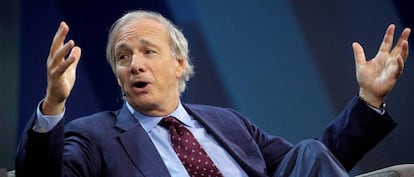The gradual extinction of the wolves of Wall Street and their hedge funds
Despite the full freedom to invest that hedge funds offer, legendary investors such as George Soros, Jim Rogers, Ray Dalio, and John Paulson have all withdrawn in the face of disappointing returns

For the layman, hedge funds are defined as investment vehicles that operate with maximum freedom. There are no restrictions and no strings attached. You can put all your eggs in one basket, if you want to. You can bet against a company or another country. And you can get into debt to increase your gains (or losses). In the 1990s and 2000s, hedge fund managers were the popular image of success. The funds made scandalous amounts of money, the managers earned a fortune, and squandered it without shame. But their ascendancy is now in decline. Returns over the past decade have been inconsistent and very disappointing, and money is starting to flee to other assets.
In cinema, the financial sharks have always been hedge fund managers, whether the characters were fictional, such as Gordon Gekko (played by Michael Douglas in Oliver Stone’s Wall Street), or real, such as Michael Burry (Christian Bale in Adam McKay’s The Big Short). They are figures who have passed into the collective imagination for their daring ability to swim against the tide and, at times, for their lack of scruples. Even George Soros, who for millions of people is the epitome of shady financial power, became famous as a hedge fund manager.
But, little by little, the wolves of Wall Street are retiring. George Soros is a 93-year-old who has handed over the reins to his son. The legendary Jim Rogers (81) moved to Singapore years ago so that his daughters could learn Chinese. And John Paulson (who, like Burry, struck gold by betting on the collapse of the U.S. housing market in 2008) retired three years ago and is now focused on his multimillion-dollar divorce.
Why have hedge funds lost their luster? Why do they no longer attract the public? According to the firm Evestment (part of the Nasdaq group), between 2019 and September 2023 hedge funds have suffered net outflows of $289,000 million. The industry is still handling $3.5 trillion, but the figure is dwindling.
Perhaps the moment when its decline became clearer was in 2017, when the sector lost the bet that the famous investor Warren Buffett had made (this one focused only on buying companies listed on the stock exchange, and nothing more). A decade earlier, Buffett had thrown down the gauntlet to the Wall Street smart guys, betting that a simple fund that replicated the performance of the U.S. stock market could beat a number of the best hedge fund managers. The Oracle of Omaha won by a landslide.
In recent years, things have not gone much better. Since the beginning of 2014, Bloomberg’s index that monitors the performance of all hedge funds has risen by 39%, representing an annual return of 3.43%. In that period, the S&P 500 has risen 178% (11% annually). Therefore, there was no need for so many managers with such high commissions.
One of the factors that causes hedge funds to have lower returns than conventional funds is that their managers charge more. They usually charge a fixed commission of 2% plus 20% of the annual return.
The industry’s black boxes
⋅ Bridgewater. A recent article published by The New York Times highlighted that the world’s largest hedge fund, Bridgewater Associates, has never been able to clearly explain how it made money for investors. It was suggested that the founder’s closeness to important figures in finance (from whom he could have obtained information) had been key. The mystery was such that even the regulator conducted an investigation to see if it was a pyramid scheme, as happened with the Madoff case.
⋅ Medallion. In 1988, mathematician Jim Simmons created what would become the most profitable hedge fund in history. The fund used sophisticated computer programs and had an average annual return over 30 years of 66%, which until then, had been something that was totally unheard of. Simmons retired in 2010.
Another situation that has created discontent among investors is the wide dispersion of returns. While large hedge funds, such as Bridgewater, Citadel, and Pershing Square Capital Management, among others, have continued to outperform the markets, the middle class of these funds has seen increasingly disappointing returns.
In addition, they are less and less detached from the evolution of the financial markets when this should be precisely one of their strengths. By having maximum freedom when it came to investing — and being able to apply strategies based on making money when the stock market falls — free investment fund managers promised returns in any market environment. But that is not what happened.
In 2022, when valuations of both stocks and bonds fell sharply, the 20 largest hedge funds posted their worst performance since 2016. In total, the hedge fund industry posted a loss of $208 billion.
Reasons for the decline
The financial markets have changed radically since the golden age of hedge funds. The information accessible with a single click is infinitely greater, as is the computing power of home computers. In addition, there are many more players and of a more varied typology: from gigantic passively managed funds that track indices to active exchange-traded funds, including powerful sovereign wealth funds. These make the financial markets more efficient. The speed of operations has also skyrocketed. It is becoming more and more difficult to find inefficiency or an arbitrage that can be exploited without attracting the attention of the other operators.
We mustn’t forget that this type of vehicle isn’t open to the general public. Each manager sets their own conditions, and they are usually very restrictive, often requiring minimum contributions of more than $500,000 and periods of more than a year. This means that only institutional investors (such as insurance companies or large pension funds), as well as some millionaires, are the most common hedge fund clients.
In Spain, where there are only €4 billion ($4.29 billion) in this type of instrument, a law is being drafted so that clients with contributions from €10,000 — compared to €100,000 now — can access free investment funds. In any case, hedge fund managers in Spain do not operate as aggressively as the Americans, and these vehicles are often used solely to buy companies’ private debt or real estate assets.
Occasionally, they are also used so that conventional investment fund managers can market a more distilled investment strategy: concentrating on a few securities, which is something that cannot be done in a traditional fund. But the results are less than satisfactory. The hedge fund Bestinver Consumo Global FIL has returned only 2% on average per year over the last decade. And the Bestinver Tordesillas FIL adds only 1.87%. Meanwhile, Bestinver International, one of the stock market’s regular funds, has reaped more than 4% APR.
Thousands of faces
As it is a type of collective investment scheme where almost anything goes in order to make money, strategies are extremely varied. One of the first they used is the so-called long/short strategy, which is based on combining bullish positions in the most trusted companies with short bets in companies that the manager believes may depreciate. In theory, money can be earned in this way regardless of the market situation.
Another variant is hedge funds that have a macroeconomic profile, which look for dysfunctions in countries’ monetary or fiscal policies in order to take positions. Perhaps the best-known case of such a fund is George Soros and Stanley Druckenmiller’s short bet in 1992 against the British pound, which brought the mighty Bank of England to its knees.

This was one of the specialties of now-retired Ray Dalio, founder of the world’s largest hedge fund, Bridgewater Associates. His close relationship with central bankers and finance ministers allowed him access to valuable information, according to an article published by The New York Times last week.
Hedge fund activists are also very popular. One of its most visible faces is Bill Ackman, the founder of Pershing Square Capital Management. In 2016 he considered that the listed firm Herbalife (specialized in the sale of dietary products) was a pyramid scheme, due to the way its salespeople were recruited. So, after making a short bet on the firm (to profit from the devaluation of its shares), he embarked on a costly campaign to discredit it. However, he was met with strong opposition from other investors and, after five years of battle (including several lawsuits) Ackman had to give up. On that occasion he lost, but between 2020 and 2022 his firm earned $3.85 billion dollars thanks to stock market hedges contracted just as the Covid-19 pandemic began to break out.
Another of the last great players in this industry is Paul Singer. With his hedge fund Elliot Management, he even engaged in a bloody legal battle with the Argentine state over the non-payment of its debt. The situation reached such a point that Singer obtained the temporary seizure of an Argentine Navy training ship when it called at Ghana.
Sign up for our weekly newsletter to get more English-language news coverage from EL PAÍS USA Edition
Tu suscripción se está usando en otro dispositivo
¿Quieres añadir otro usuario a tu suscripción?
Si continúas leyendo en este dispositivo, no se podrá leer en el otro.
FlechaTu suscripción se está usando en otro dispositivo y solo puedes acceder a EL PAÍS desde un dispositivo a la vez.
Si quieres compartir tu cuenta, cambia tu suscripción a la modalidad Premium, así podrás añadir otro usuario. Cada uno accederá con su propia cuenta de email, lo que os permitirá personalizar vuestra experiencia en EL PAÍS.
¿Tienes una suscripción de empresa? Accede aquí para contratar más cuentas.
En el caso de no saber quién está usando tu cuenta, te recomendamos cambiar tu contraseña aquí.
Si decides continuar compartiendo tu cuenta, este mensaje se mostrará en tu dispositivo y en el de la otra persona que está usando tu cuenta de forma indefinida, afectando a tu experiencia de lectura. Puedes consultar aquí los términos y condiciones de la suscripción digital.









































